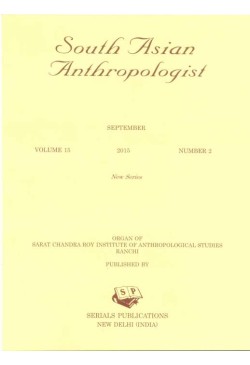
South Asian Anthropologist
Frequency :Bi-Annual
ISSN :0257-7348
Peer Reviewed Journal
The Plurality of Commons: Climate Change from an Anthropological Perspective
The concept of commons has gone through an evolutionary process in terms of natural resource management and its associated challenges. I find, coordinated efforts at multiple levels are required to bring resilience in environmental policy making as the ongoing COVID-19 pandemic has weakened conservation efforts in some key areas with a possibility of inducing further imbalance to the state of natural systems of the planet. Therefore, in the light of climate change, mass scale biodiversity loss and natural capital depletion, I propose multipronged strategy covering legal, socio-political and economic aspects to improve effectiveness and resilience of collective actions. The discipline of anthropology can provide the necessary holistic view in integrating several aspects of science, economy, human perceptions, culture and politics related to global environmental changes in order to untangle the complexity of adaptation and mitigation strategies
KEYWORDS: Global commons. Climate change. Environmental policy. Political ecology. Pluralistic approach. Covid-19. Natural resource management.
Changing Socio-economic Conditions of the Malvedat Community of Savar Upazila in Banglade
The Malvedat community were once a nomadic tribe, their manner of life has now been drastically changed. This study investigate the changing socio-economic and cultural condition of this community in the Savar locality of Bangladesh. This study is based on both primary and secondary data. A survey through questionnaire, snowball sampling, focus group discussions and case studies were conducted in the study area. The findings suggest that the Malvedat community are losing their earlier culture characterestics because of a new situation that effecting their earlier political, economic and social organizational structure. The Malvedat community has left the boat and is currently living at the shore as their place of stay. This study shows the present life of the Malvedat community and their economic, socio-cultural conditions, and the changes that have occurred due to the rapid urbanization and environmental impact in their area.
KEYWORDS: Malvedat community. Savar. Bangshi river. Socio-economic conditions. Tradition and modernity. Urbanization impact. Bangladesh.
Challenges of Deaf Education in War Khasi Village Massar, Meghalaya
Awareness among Diabetic (T1DM) Children and their Caregivers
A Comparative Study of Agricultural Practices in Villages of Solan District, Himachal Pradesh
Covid-19 and International Student Mobility from Punjab
The Status of Women: Case Study of Anun Village of Solan District, Himachal Pradesh
Prevalence and Predictors of Cognitive Impairment among Aged Males and Females: A Population Based Cross-sectional Study
Paleolithic Transitioning: An Analysis of the Prehistoric Site Banargarh of Kharagpur Hills, South Bihar
Obituary: Professor Dr Jaydip Sen